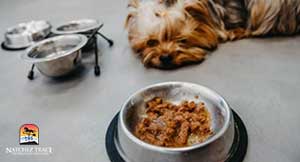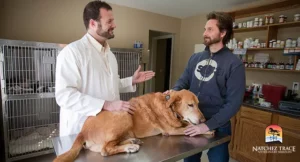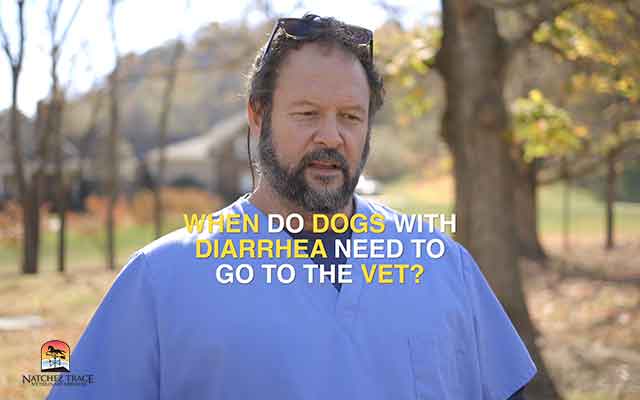 Dealing with a bout of diarrhea in your canine companion is not uncommon and often resolves without intervention. But do you really need a vet for dog diarrhea?
Dealing with a bout of diarrhea in your canine companion is not uncommon and often resolves without intervention. But do you really need a vet for dog diarrhea?
When symptoms take a severe turn, recognizing the signs necessitating veterinary attention becomes crucial. Understanding when to seek professional care amid episodes of diarrhea in dogs can be pivotal in identifying underlying health concerns and ensuring prompt treatment.
Watch this video of Dr. Smith answering the question “When should dogs with diarrhea visit the vet?”:
While mild cases of diarrhea might resolve on their own, certain alarming symptoms signal the need for immediate veterinary evaluation. Recognizing these signs of severe diarrhea and understanding their potential implications is vital for pet owners to safeguard their dog’s well-being. In this guide, we explore the critical indicators that warrant urgent veterinary attention and shed light on the role of dietary components like fiber in managing mild cases of canine diarrhea. Understanding these nuances empowers dog owners to make informed decisions and seek appropriate veterinary care when necessary to ensure the health and comfort of their beloved pets.
Signs Requiring Urgent Veterinary Attention for Dog Diarrhea
When dog diarrhea takes a severe turn, certain signs mandate immediate veterinary evaluation:
- Presence of Blood:
- Blood in the stool indicates potential internal issues, requiring prompt vet assessment to determine the underlying cause.
- Lethargy and Loss of Appetite:
-
- A dog becoming unusually lethargic, showing disinterest in food, or displaying a significant reduction in energy levels suggests a more serious condition.

-
- Abnormal Behavior or Depression:
- Any changes in behavior, such as unusual aggression, withdrawal, or depression, should be considered alarming and warrant professional assessment.
- Persistent Severe Diarrhea:
- Diarrhea lasting more than 24-48 hours despite home remedies or progressively worsening diarrhea should prompt immediate vet care.
- Potential Underlying Health Issues:
- Recognizing that severe diarrhea might indicate serious underlying health conditions such as lymphosarcoma, inflammatory bowel disease, or chronic parasites necessitates vet evaluation.
Recognizing these signs and their severity is crucial. Seeking immediate veterinary care when observing any of these indicators ensures timely diagnosis and appropriate treatment, safeguarding your dog’s health and addressing any potential underlying conditions.
When Do You Need A Vet for Dog Diarrhea?
Understanding the urgency of veterinary care for severe diarrhea in dogs is crucial for timely intervention:
- Immediate Veterinary Attention:
 Presence of blood in the stool, particularly in large amounts or accompanied by other concerning symptoms.
Presence of blood in the stool, particularly in large amounts or accompanied by other concerning symptoms.- Lethargy, loss of appetite, or any significant changes in behavior, including abnormal depression or disorientation.
- Sudden onset of severe diarrhea or persistently worsening diarrhea lasting beyond 24-48 hours.
- Signs of Dehydration:
- Noticeable signs of dehydration, such as sunken eyes, dry gums, reduced skin elasticity, or excessive panting.
- Refusal to drink water or an inability to keep water down due to vomiting.
- History of Underlying Health Conditions:
- Dogs with pre-existing health issues or a history of chronic conditions like inflammatory bowel disease, cancer, or chronic parasites need immediate attention with any onset of severe symptoms.
- Owner Observation:
- Trusting your intuition as a pet owner; if you feel something is seriously wrong, it’s wise to seek veterinary advice promptly.
Prompt veterinary attention for severe diarrhea in dogs is essential, especially when these signs manifest. Recognizing the urgency and acting swiftly ensures timely diagnosis, appropriate treatment, and the potential prevention of further health complications for your furry companion.
Role of Fiber in Managing Diarrhea
Fiber plays a significant role in regulating digestive health and can aid in managing mild cases of diarrhea in dogs:
- Improved Digestive Function:
 Soluble fiber, found in certain foods like pumpkin, oats, and sweet potatoes, absorbs water in the digestive tract, potentially firming up loose stools.
Soluble fiber, found in certain foods like pumpkin, oats, and sweet potatoes, absorbs water in the digestive tract, potentially firming up loose stools.
- Balancing Bowel Movements:
- Adequate fiber intake can regulate bowel movements, promoting a healthier and more consistent stool formation.
- Adding Bulk to Stool:
- Insoluble fiber, present in vegetables, bran, and some fruits, adds bulk to the stool, aiding in its passage and potentially easing diarrhea symptoms.
- Feeding Bland, High-Fiber Foods:
- Offering bland, easily digestible foods with added fiber, such as boiled chicken and rice, or pumpkin puree, can assist in managing diarrhea by promoting firmer stools.
- Consultation with a Vet:
- Before altering your dog’s diet or incorporating additional fiber, it’s advisable to consult a veterinarian to ensure the chosen foods are suitable for your dog and their specific health condition.
While fiber can contribute positively to managing mild cases of diarrhea in dogs by regulating bowel movements and promoting firmer stools, its efficacy varies among individual dogs. Hence, seeking guidance from Dr. Smith regarding appropriate dietary changes and fiber intake tailored to your dog’s needs is essential for effective management of their gastrointestinal health.
Home Remedies for Dog Diarrhea
Several safe and practical home remedies can help address mild cases of dog diarrhea:
- Temporary Fasting:
- Withhold food for 12-24 hours to give the digestive system a chance to rest and recover. Ensure access to water to prevent dehydration.
- Probiotics and Fermented Foods:
- Introduce probiotics or fermented foods like plain yogurt with active cultures to replenish beneficial gut bacteria and restore digestive balance.
- Psyllium Husk (like Metamucil):
 Offer psyllium husk based on weight (e.g., ¼ teaspoon for dogs under 25 pounds) to help firm up stools. Consult us for appropriate dosage.
Offer psyllium husk based on weight (e.g., ¼ teaspoon for dogs under 25 pounds) to help firm up stools. Consult us for appropriate dosage.
- Hydration and Electrolytes:
- Encourage frequent water intake to prevent dehydration. Adding low-sodium broth or electrolyte solutions to water can entice them to drink more.
- Bland Diet and Easily Digestible Foods:
- Feed a bland diet comprising boiled chicken, white rice, or plain pumpkin to soothe the digestive tract and aid in solidifying stools.
- Natural Supplements:
- Consider natural supplements like slippery elm or chamomile tea (cooled and without additives) to ease gastrointestinal discomfort.
- Home-Cooked Meals:
-
-
- Prepare homemade meals with lean proteins and easily digestible ingredients to regulate digestion and provide essential nutrients.
-
-
While these home remedies can assist in managing mild cases of dog diarrhea, it’s essential to monitor your dog’s condition closely. If symptoms persist, worsen, or if your dog exhibits signs of dehydration or discomfort, contact our clinic promptly to address the underlying cause and ensure proper treatment.
Takeaway
Managing dog diarrhea at home involves a balance between applying effective remedies and recognizing when professional veterinary care is necessary. Home remedies, including temporary fasting, probiotics, psyllium husk, and bland diets, offer practical approaches for mild cases of diarrhea, often aiding in restoring digestive balance.
 However, being vigilant for signs of severe diarrhea is crucial. Presence of blood, persistent lethargy, loss of appetite, or abnormal behavior warrant immediate veterinary attention. Moreover, understanding that severe diarrhea might hint at underlying health issues emphasizes the importance of seeking timely veterinary care.
However, being vigilant for signs of severe diarrhea is crucial. Presence of blood, persistent lethargy, loss of appetite, or abnormal behavior warrant immediate veterinary attention. Moreover, understanding that severe diarrhea might hint at underlying health issues emphasizes the importance of seeking timely veterinary care.
While home remedies can offer relief for mild cases, a prompt vet consultation ensures appropriate diagnosis and treatment, safeguarding your dog’s health. Balancing home care with professional guidance ensures the best possible care for your beloved pet’s well-being. Always trust your instincts as a pet owner and seek vet advice promptly when in doubt about your dog’s health.
People Also Ask:
- What happens if a dog has large bowel diarrhea? With large bowel diarrhea, your dog may be supremely uncomfortable and the continued straining will only make the irritation worse. In that case, your veterinarian can administer medications to ease the discomfort and to make your dog feel better more quickly.
- How long does dog diarrhea last after home treatment? In many cases, dog diarrhea will resolve after a few days of home treatment, but it’s a good idea to give us a call if it continues any longer, or if you have no idea why your dog has diarrhea.
- What are the best probiotics for dogs with diarrhea? Bacillus coagulans and Bacillus subtilis (which you can find in Dr. Smith’s probiotic/digestive enzyme supplement for cats and dogs, Harmonize GI).







